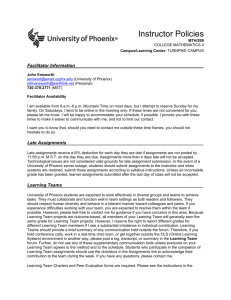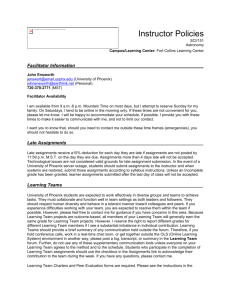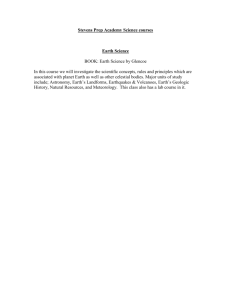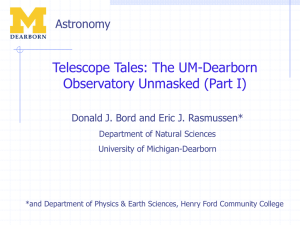Word Format - Biker John
advertisement
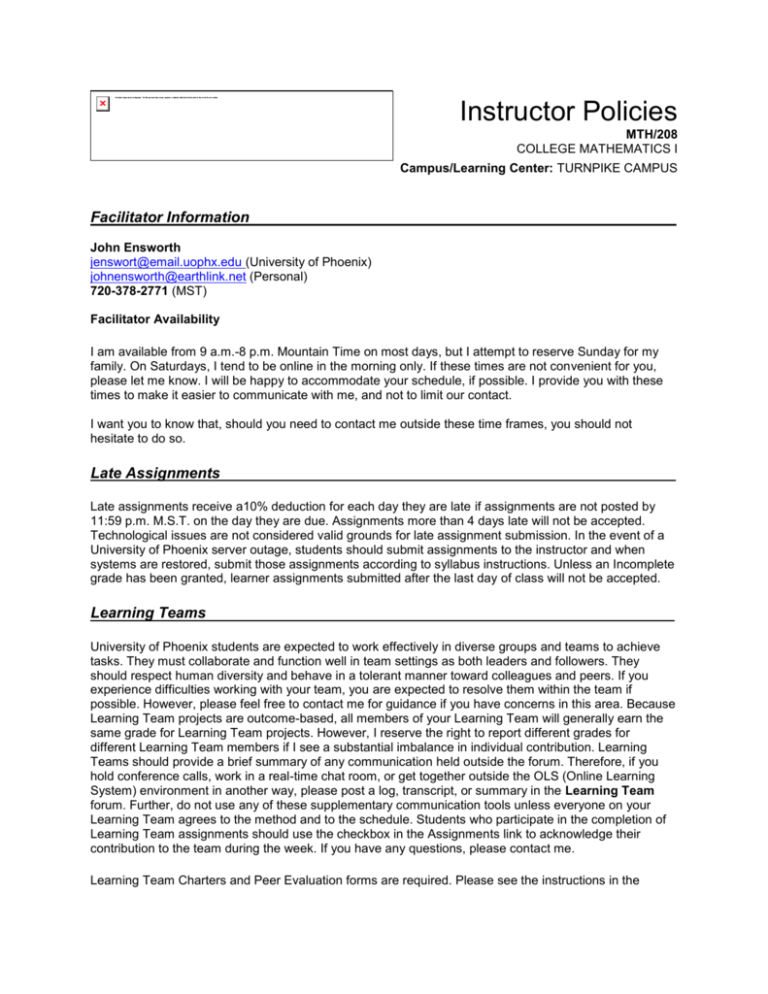
Instructor Policies MTH/208 COLLEGE MATHEMATICS I Campus/Learning Center: TURNPIKE CAMPUS Facilitator Information John Ensworth jenswort@email.uophx.edu (University of Phoenix) johnensworth@earthlink.net (Personal) 720-378-2771 (MST) Facilitator Availability I am available from 9 a.m.-8 p.m. Mountain Time on most days, but I attempt to reserve Sunday for my family. On Saturdays, I tend to be online in the morning only. If these times are not convenient for you, please let me know. I will be happy to accommodate your schedule, if possible. I provide you with these times to make it easier to communicate with me, and not to limit our contact. I want you to know that, should you need to contact me outside these time frames, you should not hesitate to do so. Late Assignments Late assignments receive a10% deduction for each day they are late if assignments are not posted by 11:59 p.m. M.S.T. on the day they are due. Assignments more than 4 days late will not be accepted. Technological issues are not considered valid grounds for late assignment submission. In the event of a University of Phoenix server outage, students should submit assignments to the instructor and when systems are restored, submit those assignments according to syllabus instructions. Unless an Incomplete grade has been granted, learner assignments submitted after the last day of class will not be accepted. Learning Teams University of Phoenix students are expected to work effectively in diverse groups and teams to achieve tasks. They must collaborate and function well in team settings as both leaders and followers. They should respect human diversity and behave in a tolerant manner toward colleagues and peers. If you experience difficulties working with your team, you are expected to resolve them within the team if possible. However, please feel free to contact me for guidance if you have concerns in this area. Because Learning Team projects are outcome-based, all members of your Learning Team will generally earn the same grade for Learning Team projects. However, I reserve the right to report different grades for different Learning Team members if I see a substantial imbalance in individual contribution. Learning Teams should provide a brief summary of any communication held outside the forum. Therefore, if you hold conference calls, work in a real-time chat room, or get together outside the OLS (Online Learning System) environment in another way, please post a log, transcript, or summary in the Learning Team forum. Further, do not use any of these supplementary communication tools unless everyone on your Learning Team agrees to the method and to the schedule. Students who participate in the completion of Learning Team assignments should use the checkbox in the Assignments link to acknowledge their contribution to the team during the week. If you have any questions, please contact me. Learning Team Charters and Peer Evaluation forms are required. Please see the instructions in the weekly sections for more information. It is expected that you will actively participate with your learning team and contribute to the team discussions by a) contributing original work that is accepted and used by the team with proof of originality b) participating in the project from assignment organizing through meaningful final review of the team project for submission, and c) ensuring to your team that your contributions are your original work and properly quoted, cited, and referenced. Classroom Management Policies Local campus facilitators: We will have 10 minutes breaks on the hour. An hourly attendance form will also be distributed. Class participation (2% of your grade each week) will be determined by the fraction of the night you are present. Discussion points will also be affected by this attendance by percent of night present. Prepare for class to run the full time 6pm to 10pm. We have a LOT of algebra to cover and practice! And, yes, that does include Week 5. Please silence (vibrate mode) cell phones and take calls outside of the classroom. You may bring a laptop to class (to access the textbook) - or bring a printed form of that week’s chapter of the e-book textbook. We will be practicing algebra almost continually throughout the course – you must bring a pad of paper and pens/pencils/erasers and a calculator (most smartphones have a built in calculator – as do the Windows and Mac operating systems – those will work just fine.) So that you may practice the problems and attend the course lecture BEFORE completing the homework – mathematical homework is due (via MyMathLab) Tuesday night at 6pm after the class that homework is due. Then you have Wed-Thurs to complete the reading for the next week. Grading Scale Grade Percentage A A- B+ B B- C+ C C- D+ D D- F 95+ 90-94 87-89 84-86 80-83 77-79 74-76 70-73 67-69 64-66 60-63 <60 Presentation Rubric Max pts Content Organization of ideas, comprehension of ideas. 20 20 Presentation Delivery (ums, ah’s, ‘lost’ pauses, appearance, uncluttered/crowded slides, proper pronunciation) 20 Length (15-20min) 20 Questions fielded 20 Total 100 PowerPoint’s used in the class and a copy of the syllabus is located at a backup Website for this class at: http://www.bikerjohn.com/classes/mth208_1/index.htm You can also find old, but still relevant, solved homework examples here. Instructor Bio I am currently the Senior Science Education Specialist at the Institute for Global Environmental Strategies which is a non-profit organization formed (among other things) to conduct independent reviews on all Earth and space science education products produced by or for NASA. (www.strategies.org) My position is the one responsible for directly conducting these reviews and yearly workshops at NASA centers and at the large education conferences (i.e. NSTA, NCTM) that introduce the products that pass on the criteria of scientific accuracy and classroom usability. The last decade I was a masters student and a PhD candidate in meteorology at the University of Oklahoma. I have earned undergraduate degrees in physics, astronomy, geography and meteorology with minors in math and computer science. I became interested in astronomy in the 2nd grade and began to teach astronomy to cub scouts and boy scouts by the 5th grade. I began to work for the Arizona State University planetarium when Halley’s Comet paid the inner solar system a visit in 1985-1986 and taught the astronomy labs, became head TA and eventually taught an astronomy class through the rest of the 80’s (as an undergraduate). I have worked an internship at Steward Observatory, at the University of Arizona, Tucson, site testing for the placement of the Mt. Graham observatory complex. I’ve also observed at the 4-meter telescope at Kitt Peak, a 36” telescope at Kitt Peak, and at the MultiMirror Telescope at Mt. Whipple. I’ve successfully over 50 astronomy nights for Norman residents and OU students and students and the public in Virginia and Maryland and have worked at the Oklahoma City Omniplex Planetarium for almost 10 years. I’ve taught astronomy for the college degree completion program at Mid-America Christian University (formerly Mid-America Bible College) for the last 3 years and am a member of the Oklahoma City Astronomy Club. I have also served an internship at NASA Goddard Space Flight Center. In environmental science and related fields, I began to study meteorology and earth science in the 5th grade when my telescope got rained on during an freak night time desert thunderstorm. Convinced I could forecast better than the guys in Phoenix, I began to study the weather. In college I conducted the meteorological investigations for the placement (site testing) of the Mt. Graham Observatory complex and helped astronomers understand what makes stars twinkle (it is a blurring of the image caused by turbulence and density currents in the lower few hundred to a thousand feet in the atmosphere). I also worked on a project to trace the origin of air pollution in the Grand Canyon. As a graduate student I conducted field research on lightning, fine scale (time and space) rainfall variations, aided in a geographic study of rainfall and plant distributions by elevation at Black Mesa, OK, and chased tornadoes. I taught meteorology, earth system science and helped with environmental geography courses throughout the 1990’s and into the 2000’s. I keep the weather channel on enough at home to burn lines into the TV screen. Mathematically, my areas of study require the highest levels of math out there (darn it) so I have to speak Algebra, calculus, trigonometry and the like as second, third, fourth etc. languages. And, besides, math is FUN!
